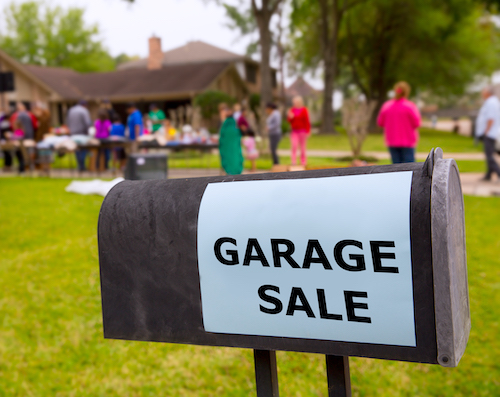What Is An Estate Sale (And How Do They Work?)
Paul Williamson – April 13th, 2020
Paul Williamson – April 13th, 2020
An estate sale is a method of selling all (or nearly all) of the contents of a home. Estate sales typically occur after a death or other event that causes the inhabitants to quickly move away from the home. Estate sales usually take place over several days and are open to the general public. Most of the time, a professional estate sale organizer holds the sale on behalf of the family members.
Here’s a simple estate sale definition: An estate sale, or a tag sale, is designed to dispose of your own or a loved one’s possessions in an orderly fashion. It’s much more than a yard sale, as everything is marked with a price tag and is up for grabs. So, what does “estate sale” mean? Quite literally, it means the sale of someone’s entire estate.
Typically, yes. Sometimes, the family may keep a few favorite pieces. If a realtor has put the house on the market, the new owners may want certain items, and they’ll list those things in the contract.
Otherwise, everything has a price tag with a marked price. This is why it’s sometimes called a tag sale.

Estate sales occur for several reasons. Often, the estate’s previous inhabitant passed away, and the family members who inherited the estate perform an estate liquidation on the property.
However, estate sales can take place for several other reasons. Maybe the home’s inhabitants are moving because of health reasons, a job change, or a divorce.
Simply put, an estate sale happens when someone needs the home’s assets to be sold or otherwise liquidated.
Organizing an estate sale takes planning and hard work. In addition, family members are often emotionally tied to the items for sale. Here’s where an estate liquidator steps in, as they objectively manage the sale from start to finish.
An estate sale is somewhat similar to a garage sale (also known as a yard sale). In both cases, the sale takes place on the home’s premises, and both are open to the public.
However, estate sales have some major differences compared to yard sales. On the first day, estate sale buyers often line up at the front door before the sale begins. This is because buyers are only allowed to enter on a first-come, first-served basis. In fact, eager bargain hunters and antique dealers often line up several hours beforehand.

An estate sale also differs from a garage sale in two more significant ways. Garage sales typically take place in the driveway and/or the yard (hence the term “garage/yard sales”). In contrast, estate sales take place throughout the entire home and premises (i.e. why they’re called “estate sales”).
Garage sales typically include selected items that the home’s inhabitant wants to dispose of. However, estate sales generally include everything on the estate.
People often confuse the terms “estate sale” and “estate auction.” Both events are designed to liquidate nearly the entirety of someone’s personal property, and both are open to the public. However, Wikipedia states that, at an estate auction, each item is auctioned off and sold to the highest bidder. On the other hand, an estate sale is not an item-by-item sale event.
During an estate auction, an auction company and a highly-skilled auctioneer manage the event. The auctioneer is a member of their state and national auctioneers’ associations, and they follow a strict code of ethics. The auctioneer calls each item one by one, and the item goes to the highest bidder.
With an estate sale, there is no auctioneer. Shoppers are allowed to peruse the home’s assets at their leisure. The prices are set, and shoppers do not have to place competitive bids on items.
So, how does an estate sale work? First, the estate sale organizer separates items into categories and appraises them based on their market value. Then, a few days before the sale, the organizer places price tags on each item. On the estate sale day, the organizer takes a final walk through the home before opening the doors to buyers.
If there’s a line, buyers are allowed in on a first-come, first-served basis. Some estate liquidators use a number system, with buyers receiving numbers that match their place in line. Other estate sale organizers draw random numbers to determine which buyers enter the home first.
Throughout the sale, shoppers are allowed to walk freely about the home, examining each marked item. As shoppers snag them and pay on their way out.
Shoppers can pay for their purchases with cash, checks, credit cards, or debit cards. The ability for shoppers to pay with credit cards can often spur the purchase of high-end items. The estate sale company decides which forms of payment it accepts.
During the estate sale, the estate liquidator ensures the sale goes smoothly by managing the traffic flow and resolving pricing issues. Be aware that most estate liquidator contracts don’t allow any family members to be present on the estate sale day.
This is because it can be hard to watch strangers poke through your own or your loved one’s belongings. However, if you want to maintain access to your home throughout, select an estate sale company that allows for family member access.
Estate sales are often overflowing with furniture, home furnishings, and assorted household items. Buyers may also discover artwork and fine jewelry. Antique dealers and private collectors flock to estate sales in search of antiques and collectibles from varied eras. Power and hand tools, automotive items, and specialty items are also popular.

Estate sale pricing is conducted by the estate sale organizer, who prices most items based on their market value. This is how each item’s price tag is established.
However, organizers can also do on-the-spot pricing for certain items. After the first day, organizers typically discount items to encourage buyers to snap up the bargains. Discounts can range up to 75% off the original price.
At the end of the sale, the estate sale organizer decides how to dispose of unsold items. If the organizer owns an antique store or online antique shop, they may pack up the antiques and collectibles for sale in that venue. Online marketplaces, like
Craigslist and eBay might also be good options.
Some estate sale companies partner with non-profit stores, who are very happy to pick up unsold items at the end of the sale.
Although the antiques and other valuables have likely been sold, many household items may still be available. Additionally, if there’s nowhere else for the items to go, the estate sale organizer can place leftover items in an onsite dumpster.
Finding a reputable estate sale company shouldn’t be difficult, and it’s the key to a good outcome. Here are two elements to look for when looking for an estate sale company.
If you’re selling the house, your real estate agent usually has estate sale connections. An internet search provides names of estate sale companies in most cities or towns. Searching estatesales.net may produce some results as well.
When searching for an estate sale company, look for one that’s bonded and insured. Although the estate sale industry doesn’t have a formal governing body, there are a few professional associations that help to establish credibility. The Better Business Bureau can also be a good source of information and referrals from satisfied customers are especially valuable.

 Most Valuable Beanie Babies (Complete Value Guide)
Most Valuable Beanie Babies (Complete Value Guide)